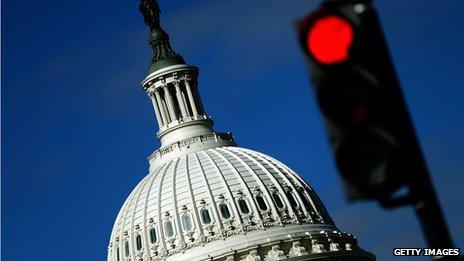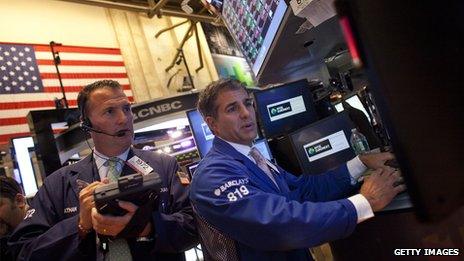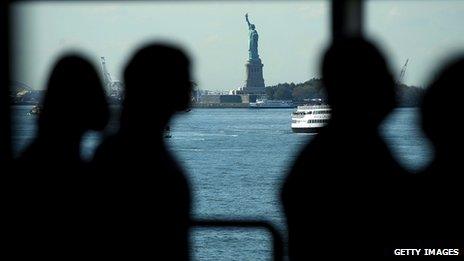What's the economic impact of a US government shutdown?
- Published

Markets are hoping a shutdown doesn't mean a red light for the US economy
The US government partial shutdown is over after 16 days.
Hundreds of thousands of workers were laid off, businesses have been hurt, and the standing of US credit in the eyes of the world was severely impacted.
But what exactly has the economic impact been?
Standard & Poor's says the shutdown has cost the US economy $24bn (£15bn), shaving 0.6% off of economic growth this quarter.
And investors have not been happy - particularly foreign nations, like China, which own US debt.
The yield on short term US Treasury bonds - the amount the US government most pay to investors to hold US debt - has risen, increasing US borrowing costs and indicating that global investors have become unhappy with Washington wrangling.
No economic barometer
However, markets have not reacted as sharply as they did during prior budget negotiations, particularly during the 2011 debt ceiling negotiations that saw yet another last-minute deal.

Traders at the NYSE think the economic impact of a shutdown will be minimal
Overall, US stocks are up 18% for the year.
The business community remains focused on other concerns, like when the Federal Reserve will begin to ease off its extraordinary efforts to prop up the US economy - something the central bank says will not happen any time soon, partially due to Washington dysfunction.
"They're going to eventually get to a compromise and then we'll move on," O'Neil Securities trader Kenny Polcari told the BBC from the floor of the New York Stock Exchange.
A veteran trader, Mr Polcari was also at the NYSE during the last government shutdown, from 1995-96.
Back then, he remembers, markets sold off but then actually rebounded.
"A government shutdown is not necessarily a comment on the state of the US economy," says Mr Polcari.
"All indications are that the US economy is starting to turn a corner."
Benedict Willis, another trader at the NYSE, said that in fact, companies might start to use the shutdown as a way to justify less than stellar third-quarter results.
"Every company will look for an excuse if they're weak," says Mr Willis, a managing director at Albert Fried & Company.
"The government has certainly given them one."
'A little numb'
For many businesses, another debt squabble in Washington is just background noise during a time of good, if not great, economic growth.

David Zarin says he's not worried about the shutdown's impact on his fabric store
"The difference between now and a couple years ago was that a couple years ago we were coming out the depths of a recession," says David Zarin, who owns a fabric store on Manhattan's Lower East Side.
During the debt ceiling negotiations of 2011, he says he saw his business decline in the wake of so much uncertainty at a fragile time of the US economic recovery.
Now, while business isn't as a robust as it was before the crisis, he's no longer as sensitive to what he calls "Washington posturing."
"Frankly, I'm a little numb," he says.
One place, however, was significantly impacted by the shutdown.
Economic tsunami
According to George Mason University professor George Fuller, the Washington DC area lost an estimated $220m a day while federal workers and contractors were furloughed.

Tourism revenue would decline as US federal parks close during a shutdown
Overall, the federal government accounts for one-third of the region's economy.
Furthermore, uncertainty is never good for hiring.
One-half of bosses surveyed by the Business Roundtable "indicated that the ongoing disagreement in Washington over the 2014 budget and debt ceiling is having a negative impact on their plans for hiring additional employees over the next six months".
Consumer confidence measures plunged as a result of the shutdown - not a good sign for the US economy, because consumers account for 70% of all spending.
Furthermore, the shutdown impacted the release of economic data, particularly important measures of job creation and prices.
So the full impact of the shutdown may not be understood for many months, until the various agencies responsible for collecting and releasing the data can get restarted.